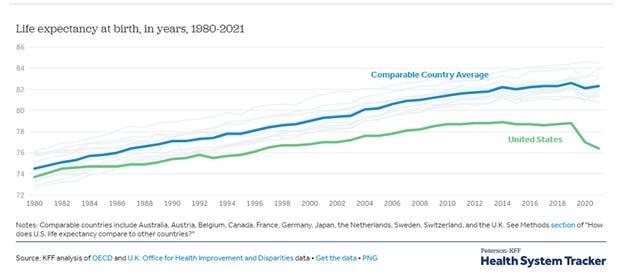The opposite of a great truth is also true, Niels Bohr said. For example, life is long, and life is short. This is a philosophical problem, and it is a problem for financial planning. We all know people who died way too young, and we all know people whose final days were miserable.
We’re all living each day as if it’s our last while also planning for the future. Eating desserts because life is short and eating vegetables in pursuit of a long and healthy life. It’s a lot.
The U.S. Social Security Administration collects data on life expectancy from two perspectives: life expectancy at birth and life expectance at age 65, the standard retirement age. The two numbers reflect distinct factors affecting life expectancy. Life expectancy at age 65 shows how much longer you’re likely to live once you’ve made it past the gantlets of infancy, youth, and middle age. It reflects improvements in medical care, especially oncology and cardiology. Life expectancy includes improvements that extend life, but it is very much affected by infant and early childhood mortality (both of which are way too high in the United States).
The chart above is from the Kaiser Family Foundation, a major health care research center, and it looks at data reported to the Organisation of Economic Cooperation and Development, an economic consortium of the world’s most developed countries. As you can see, the US not only has a life expectancy that lags that of its peer countries, but its life expectancy has gotten worse instead of better. This is the case even though the United States spends more money on per capita healthcare than any other nation and has the most technical medical expertise. We are not getting our money’s worth!
There are so many reasons for this: expensive primary care; gun violence; “deaths of despair”; COVID denialism. Doctors are working miracles with certain types of cancer but can’t put people back together after they’ve been shot up with an AR-15. But because there are so many reasons, it’s difficult to come up with a comprehensive solution (Washington Post gift link).
Never fear, though: there are a bunch of billionaires trying to extend their lives into infinity. Elon Musk, Jeff Bezos, Larry Page, and Larry Ellison are among those playing with immortality assume that they have the money to have fun and pay people to hang out with them. They’re doing things that will extend the life of an individual who has already made it into middle age. One could argue that they could do more to raise the numbers by paying taxes to fund better pre, peri, and post-natal care.
What do you think? Please share your thoughts in the comments.







I totally agree with you assessment, Annie! We spend far too much for the shoddy healthcare we get. The disparity in care between rich and poor, Black, brown, Asian, and white is another issue that needs to be addressed, because we all do better when we are all healthy. Disease doesn't see wealth or color, and disease spreads.
Great blog. You reference the 2 types of life expectancy. You show the "at birth" chart from Kaiser. Is there a comparable one for 65?